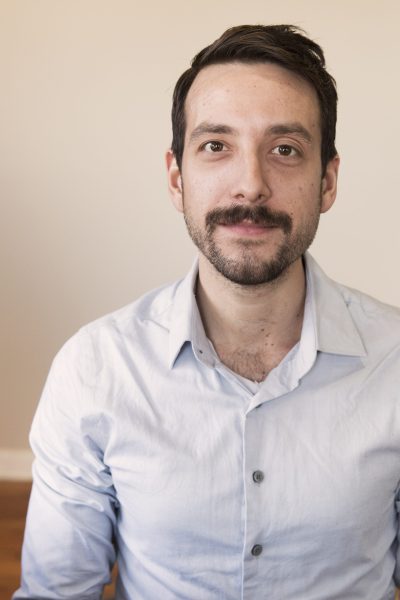You have an extensive background in music. You’ve been a performer, a youth orchestra conductor and a music teacher. I’m curious if your background in music influences your writing. Do you think there’s a connection between the two?
Yes, and the more I write, the more I rely on that connection. There is of course a musical way of thinking about language that influences everything from word choice to the contours of the work itself. It is difficult to overstate how much this has informed my artistic values. Regarding my writing process, studying music prepared me to make constructive use of feedback and to seek collaboration whenever possible. My first writing workshop felt very much like a studio performance—presenting work to a panel of peers and a facilitator—with all the accompanying stress and anxiety. That kind of pressure can, in the long run, be extremely beneficial.
My stories often depict musicians or artists of some other sort, because their struggles are the ones I know best. However, music can also serve as a point of entry to a character or a place that doesn’t come to me so naturally. Music and creative writing both amplify this invaluable human capacity: to understand, to some degree, identities and experiences that will never be our own.
You’re a third-year MFA candidate at The Ohio State University. As you near the end of your program, I’m curious if you have some thoughts about it, or perhaps some goals that you want to accomplish before you graduate.
The decision to pursue an MFA was not an easy one. It meant leaving a job I loved and my solid West Philadelphia community of queers and artists along with it. I drew so much support and inspiration from that place, and I was skeptical that I would find anything similar in academia, let alone in Columbus, Ohio. Adjusting wasn’t easy, but now that I’m almost done, I have so much gratitude for the friends, mentors, and experiences that have defined my MFA experience. I have gained a few excellent readers who continue to make my work stronger and more honest. I have gained a mentor in my advisor, the very generous Nick White, and I’ve become part of the vibrant, queer, and growing activist community of the city. No graduate program is perfect, and I’ve had to adjust my expectations in some respects, but I would do it all over again if I could.
As for goals, I hope to provide a platform for a few more truly great emerging prose writers through my editorial work at our magazine, The Journal. I’d like get a few more publications under my belt—I’ve got a bunch of stories and lyrics essays I’m trying to find homes for. Then there is my thesis, which is a big novel about politics and polyamory. I won’t be totally finished by graduation, but I hope to have most of it drafted, at least.
What do you love about writing flash?
So much! I see flash as a great technical challenge, which appeals to my musical sensibilities. Every word, every aspect of structure from punctuation to paragraph matters so much more than in longer forms. But I also love how brevity permits malleability. All of my most successful pieces of flash have undergone one metamorphosis after another. A writer can start with a notion—a particular nostalgia, a sense memory, a new outrage—and wind up discovering something far deeper and more true about themselves or the world, all in one afternoon. The ability to write truly great flash is a kind of superpower, one that I see reflected in the work of my favorite writers of short short forms: Diane Williams, Kim Chinquee, Susan Laier, Lucie Elven. I teach all these writers when I teach flash fiction, and my students and I have learned so much.
What kind of story would you love to find in the queue this week?
At the micro level, I’ll be looking for polish, not perfection: unforgettable images, sensory details, consistent sentence work, action, diction that surprises. Unfortunately, these characteristics presented in isolation may not add up to what I’m looking for. At the macro level, there must be unity and movement, event and emotion, a deep, rushing current of meaning below the surface. I’m really open to most subjects and structures, but a piece that is entirely ruminative with little or no dramatic action will have to be firing on all cylinders to catch my attention. I hope to find a piece that I can reread over and over and keep learning from.


 The SmokeLong Grand Micro Contest (The Mikey) is now an annual competition celebrating and compensating the best micro fiction and nonfiction online.
The SmokeLong Grand Micro Contest (The Mikey) is now an annual competition celebrating and compensating the best micro fiction and nonfiction online.